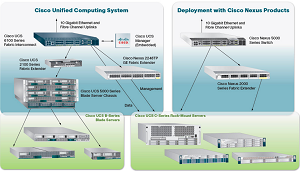News
Cisco Partners with Red Hat on Cloud Computing and Software-Defined Networking
After a big layoff announcement following a poor financial quarter, networking giant Cisco Systems Inc. escalated its partnership with open source leader Red Hat in several enterprise computing areas, including the cloud and software-defined networking (SDN).
The moves come as the vendor of traditional networking products staves off competition from upstart SDN and virtualization technologies, sophisticated cloud initiatives and an industry move toward open networking.
The Wall Street Journal and others have reported how the proprietary networking pacesetter is under pressure from customers and analysts who want to see the company emphasize "lower prices, interoperable gear and faster innovation with new SDN networking gear."
Bloomberg, meanwhile, reported "Goldman Sachs Group Inc., Verizon Communications Inc. and Coca-Cola Enterprises Inc. are telling the world's largest networking-gear maker that they won't keep paying for expensive equipment, when software can squeeze out more performance and make the machines more versatile," in an article titled, "
Cisco CEO Pressured by Goldman Sachs to Embrace Software."
In what could be seen as a direct response to the aforementioned criticisms, Cisco and Red Hat announced an escalation of their partnership in three main areas: the open source OpenStack cloud platform; Cisco's Application Centric Infrastructure (ACI) -- it's answer to SDN; and the "Intercloud," described by Cisco as "a network of clouds."
"Cisco UCS Integrated Infrastructure for Red Hat Enterprise Linux OpenStack Platform (UCSO) will combine Cisco Unified Computing System (UCS), Cisco ACI and Red Hat Enterprise Linux OpenStack Platform," the companies said in one of many announcements yesterday.
 [Click on image for larger view.]The Cisco Unified Computing System.
[Click on image for larger view.]The Cisco Unified Computing System.
(source: Cisco Systems Inc.)
UCS is a five-year-old data center platform that seeks to integrate hardware, virtualization support, switching fabric and management functionality into one cohesive platform, simplifying management, according to Wikipedia.
Cisco said its UCS Integrated Infrastructure solution combines UCS servers with Nexus switches, UCS Director management software and storage access as key components for building private, public and hybrid clouds.
On the OpenStack aspect of the expanded partnership, the companies said they "are working together to provide fully supported, certified platforms that deliver open source innovation and optimized functionality. The companies intend to collaborate to deliver validated architectures, a growing third-party ISV and IHV ecosystem, governance across clouds, and advanced services for lifecycle management of cloud solutions."
In the ACI part of the initiative, the companies said they "are extending the Cisco ACI policy framework to OpenStack environments, enabling customers to leverage greater policy-based automation in their cloud environments."
For the Intercloud, "Cisco and Red Hat intend to develop carrier-grade, service provider solutions for the Cisco Evolved Services Platform -- Cisco's software and virtualization platform for hybrid cloud deployments. Red Hat and Cisco also collaborate around OpenShift, Red Hat's award-winning Platform-as-a-Service (PaaS) offering, and storage technologies, including Ceph."
The new UCSO collaboration between Cisco and Red Hat is expected to come in three variations: a Starter Edition; an Advanced Edition; and an Advanced ACI edition.
The Starter Edition, expected by year's end, is designed for the simple and quick installation of private clouds. The Advanced Edition is for fast deployment and management of large private clouds. The Advanced ACI Edition that will use Cisco's ACI technology to deploy and operate policy-driven infrastructure for large-scale clouds.
"Open source technology has emerged as the catalyst for cloud innovation," said Red Hat exec Paul Cormier. "Cisco is a market leader in cloud infrastructure and integrated infrastructure, while Red Hat brings market leadership and deep domain expertise of open source and OpenStack. By combining our complementary strengths, Cisco and Red Hat have a unique opportunity to capitalize on this market disruption."
About the Author
David Ramel is an editor and writer at Converge 360.